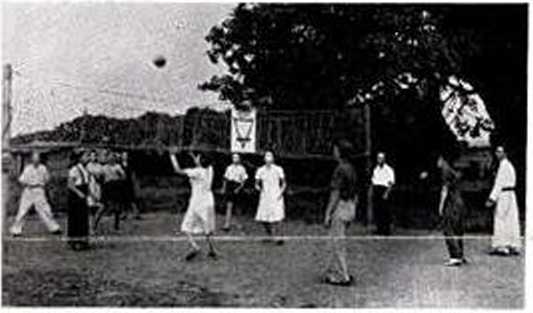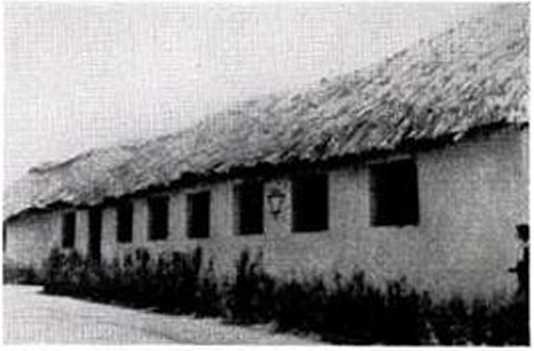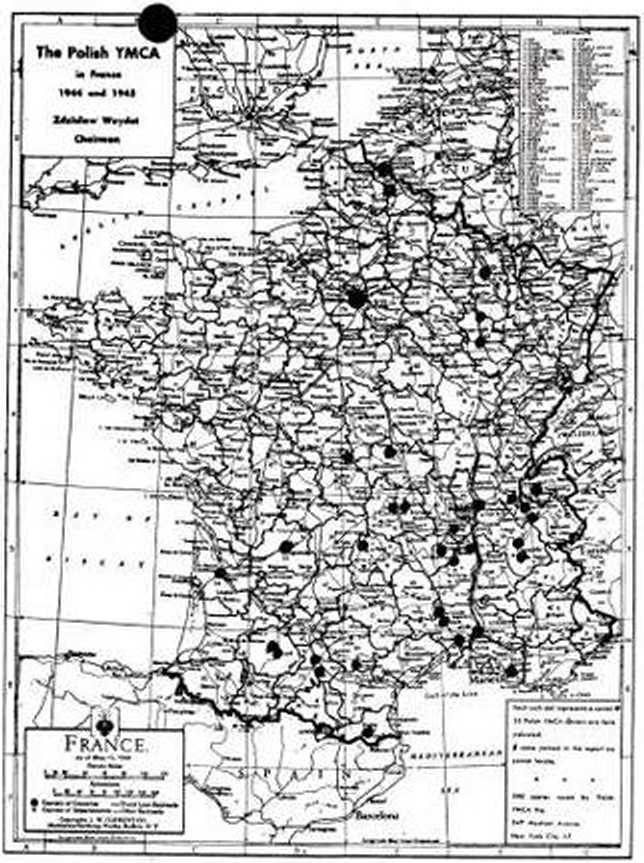7349812731
/ /
The Polish YMCA Bulletin
For Bulletin Boards and Private Persons Devoted to Matters of Polish Reliei and Social Welfare
Issued by the Polish YMCA American Headąuarters, Paul Super, Editor, 347 Madison Ave., New York City 17
This mttoriaJ msy bo roproducod without credit.
Th o Poliah YMCA operatoa undor tho Pre*ident's War Roliof Contro! Board Permit No. S5.
|
«■ |
■ V ‘l |
It | |
A Corner of tlić Sport Field

AFR1CA
THE POLISH YMCA CENTER AT KONDOA, TANGANYIKA
One of 24 such Polish YMCA ccnicrs in Łasi and South Afriu
38 cmployed workcrs in Africa.
The <utliii" anil Scyning (
Each such building is a social home and chc center of a widc and practi-cal program of activitics for w omen and men. girls and boys.

The Polish YMCA Building
At kidugala. Tunganyiku. the loeul nntiye Negrors, oeeing aur center in operution, ask.d the Polish YMCA to Imild mid operate one for tliein. They diijMll in a rrowded tuceew.
Somelime* tiiooe hIio have ieaat. givc most.
NOTES FROM SEYERAL FIELDS
Scotland. I hc Polish YMCA has taken ovcr a convaiescent homc at Bonskcid in che Highlands to operate it for wounded Polish soldicrs.
Germany. Since April 20 the Polish YMCA has bccn at work in Germany, with General Mac2ek s Armored Division.
England. The Central Committee of the Polish YMCA in London will take an important part in the growing work for cx-prisoners of war and "displaccd persons."
Ita/y. After insriccting Polish YMCA work in Lgypt, Palestinc. and Syria in April. Mr. Kenneth Smith, my collcague in Polish work. procceded to Italy on the same errand; thencc hc will go to France and the Western Front in May. Back to London in June.
Neu York. The Polish YMCA rccciscd S 100,000 front Polish War Relief, National War Fund, in 1944. This year it is asking for S300.000 for its rapidiy cxpanding work. Its present regular subsention front Polish War Relief is S5.000 a month. The opcracions of the Polish YMCA in 16 countries now amount to about S 100.000 a month.
W hal They Sny. Extracts from rcccnt letters.
Hon. Władysław Raczkiewicz, Prcsident of Poland: "This report proces how great and valuablc arc the services rendered by this social institution to the Polish Fighting Forces and to Polish refugees. The Polish YMCA gains ever*increasing appreciation from all Poles." — London, March 26, 1945
Hon. Tomasz Arciszewski, Primc Minister of Poland: "I am very well-aci|uainted with the splendid work you have bccn carrying on in Poland for ovcr 20 years—wnosc fuli valuc is being rccognizcd and apprcciatcd by us all."— London. March 13, 1945
Gen. M. Kukieł, Minister of War: "I:xtreniely uscful and valuahle work.” — London. April 9, 1945
Gen. W. Anders, Acting Commander in Chief: "Has carncd the deep gratitude of our fighting men.”— London, April 3, 1945
Dr. Adant Pragicr. Minister of Information: "1 take this opportunity to tell you how dccply impressed I am by the splendid work the Polish YMCA is doing in thcsc dilficult days." — London, March 21, 1945
THE ROLE OF THE POLISH YMCA IN POLISH RELIEF
An Ediłorial
A complcte program of relief and welfare work has large tasks in threc areas, the body, the ntind, and the spirit. The body is the fouttdation; materiał nccds arc basie and tremcndously pressing. But the foundation is without walls and roof and conłcnts if the needs of the mind and spirit arc ncglcctcd.
The welfare tasks of the body arc fivc: housing, food, clothes, medical aid, and cmploymcm. Those of the mind and spirit, which are not easily separated, arc social lifc, cultural and cducational work, mcntal occupation. reereation, the wise use of leisure. the deselopment and presersation of character and morale, and prosisions for worship and the exercisc of religion.
To meet these needs we have three basie types of welfare and relief organi-zations and operations: 1. OUicial relief agencies and the Red Cross; 2. Schools and the YMCA; 3. The Church.
In that middlc arca the YMCA movemcnt, now ovcr 100 years old, is the pionccr in the providing of social centcrs having a charactcr-building and cducational program. It has developed that idea all around the world and niorc highly than any other organization.
Among the Poles, that role is played by their own Polish YMCA, now almost 25 years old, and operating 175 centcrs in 16 diflfercnt countries for the welfare of Polish refugees, students. orphans, and soldicrs. It must now develop a huge program of welfare work for cx*prisoucrs and foreed labor victims. It scrvcs men, and women, boys and girls.
This middlc arca, social center work, is not a subordinatc arca. it must march along with the other forms of relief. It is a phase of the truth that man docs not live by bread alone.
The Polish governinent authorities recognize this, and ask agencies financing Polish relief to providc for this type of work in their Financial programs and hudgets. They have given the Polish YMCA a front-line position in the enter-prisc of presersing the Polish people, of maintaining the decendes of lifc abovc the animal lcvel.
FRANCE

41 center* for Poliah soldicrs, refugees, ex-priiw»neri* of war, released forced la ho rera, rilizens deported from Pidaml by the German*, hutidred* of thouaand* of digplaced people.
The 194445 work of the Poliali YMCA in France.
Part of a silni reconalrticlion program for Pole* whcrevcr they are.

ro
o
- t
r\>
SALUTE TO CANADA
We have rc*crvcd ihi# apnee for a npcrial aniute to Canada for the
large role it* Citizen* hnve played in the deyelopment of the Poliah
YMCA from the sery heginning in 1919 unii! today, from Dr. W. J.
Ronę and Dr. A. K. Crifłin to Mr. J. S. W. Grocholski and a large
grotip of Ctinadinns of Poliah aneestry w ho have recently gol under
this load. The recortl i* long and impretwiye, and our gratitude
verv real.
0
A PRAYER FOR THE POLES
%%0 Goił, the Crcator and Prcwrv(*r «f nil tnankind* wc liumldy heneech Thec for nil aort# and condition* of men; we commend to Thy fatherly goodne^ all tliofte who are in any way afllicted or din-tre**ed« in iuiud, hody, or estate, m/nrm//v ihe l*olish pcoplc* that it may plea*c Thee to comfort and rclieve litem. according to their seyeral nrccH^itica, £iving theni patience under their fttiffcringłi, and a happy i^ue out of all their afllictioitft.”
Wyszukiwarka
Podobne podstrony:
skan0023 In the U.S., tornadoes ire responsible for 80 deaths and morę than 1,500 injuries each year
42985 Suzuki RM250? TRANSMISSION AND CRANKSHAFT 8-7 ♦ Inspect the gearshift cam groove for abnormal
READING COMPREHENSION PART 1 For questions 1-8 match each ofthe statements below to one of the book
Polish Association for Computational Mechanics and the Scientific Committee of the CMM2017 hercby gr
179 ordered them from the masters of the Iagellon University and in this way laid foundations for th
Bulletins Fig. 2 Laboratory for Hydraulic Research and Soil Mcchanics, Swiss Federal Institute of Te
img026 Migration Tool for NetWare lUsers and groups are migrated I to the domain controIIer The doma
Fig. 5. Initial val-ues and lowcst skin temperatures mcasured on the fingers for all subje
ECONOMICS AND EIWIRONMENTJournal of the Polish Association of Environmental and Resource EconomistsE
Ensino da geografia: caminhos e encantos PDF eBooks Download and criminal, The atmosphere was ripe f
5) Oracle Database for the alignment monitoring tables, optical sensors data and conditions data, ma
Information for Authors Send to: Archives of Civil and Mechanical Engineering Poli
więcej podobnych podstron